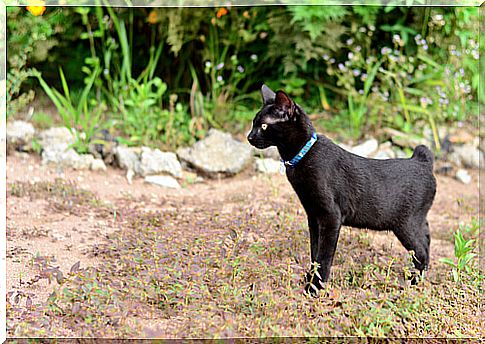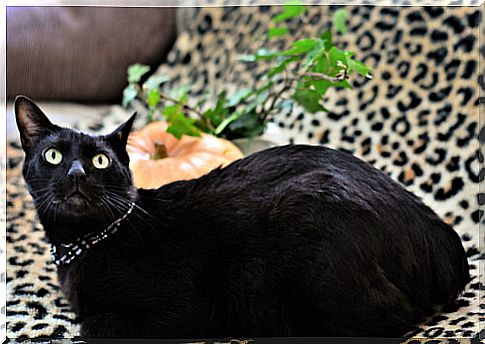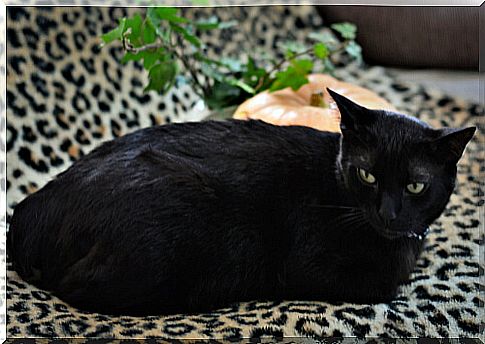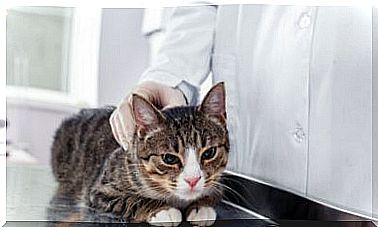Japanese Bobtail: Care And Behavior

The Japanese bobtail is a very ancient Asian feline breed, whose origins still hold many mysteries. These cats are characterized by their very short tail, and they also attract attention for their extremely sociable and affectionate nature.
Although they have inhabited the Japanese islands for more than 1,000 years, these specimens only regained greater international popularity in the last decades of the 20th century. Next, we will know a little more about the Japanese bobtail, its behavior, health and basic care.
Physical characteristics
Japanese bobtails are medium-sized cats, which can weigh between 2.5 and 4 kilos. Its body is fine and slender, but it shows well-developed musculature.
Long, strong legs offer this feline dexterity and plenty of flexibility when running and jumping. But the most striking feature of this feline breed is, without a doubt, its very short tail.
Its head is shaped like an equilateral triangle and its size is proportional to the rest of the body. The eyes are large, wide and oval, whose colors usually harmonize with the fur of the pussycat; their ears are rounded at the tips and are almost always erect.
The coat of the Japanese bobtail can be short or long, but its texture will always be silky and soft to the touch. In the long-haired specimens we see slightly wavy fur at the tips.

A great variety of solid colors can be seen in these cats, with the exception of Siamese, lilac, chocolate and Abyssinian. In addition, bicolor males in black and white are recognized, and tricolor females in white, black and red.
Behavior of the Japanese bobtail
The Japanese bobtail cat dazzles with its affectionate, intelligent, sociable and playful character; It is much more outgoing than the vast majority of feline breeds.
Although they enjoy their moments of serenity, these kittens are usually always predisposed to play, learn and receive the caresses of their relatives. Therefore, its popularity as a pet has grown enormously around the world.
As a particularity, these cats do not like to be alone or locked up for a long time, which is why they adapt better to houses or flats with external spaces (garden, terrace, etc.).
Due to their great intelligence and sensitivity, they need daily physical and mental stimulation to maintain their good health and balanced behavior. If they do not live in an enriched environment they can develop symptoms of stress very easily.
Another curiosity is that these cats are usually very expressive and have the ability to emit a wide range of sounds to communicate with their owners. In fact, this breed is renowned for their ‘singing voices’, which can sing different melodies in their home routine.

Essential care
The Japanese bobtail requires regular brushing to maintain the beauty of its coat and prevent the formation of hairballs in its digestive tract. Short-haired cats should be brushed at least three times a week.
If the kittens are long-haired, they will need daily brushing for optimal maintenance of their fur. This daily chore will be offset by the beauty of your freshly combed outward appearance.
A complete and balanced nutrition will be key for your feline to fully develop its physical, cognitive, emotional and social capacities. It is always advisable to have the guidance of a veterinarian to choose the most suitable diet for the Japanese bobtail.
As they are very active and intelligent, these cats need to live in an enriched environment that stimulates their curiosity and allows them to exercise their body and mind. In addition, the company of their masters will be essential for a Japanese bobtail to enjoy a happy and healthy life.
Japanese bobtail cat health
The estimated life expectancy for a Japanese Bobtail cat is 9 to 15 years. However, its actual longevity will depend on the care and environment provided by its owners. Kittens who live in a positive home and receive proper care may live longer.
Like all feline breeds, the Japanese bobtail shows a genetic predisposition to certain diseases. Next, we list the most frequent pathologies in the Japanese bobtail cat:
- Hairballs in the gastrointestinal tract (trichobezoars).
- Urinary and kidney problems.
- Obesity (when they are subjected to a sedentary routine).
Finally, it must always be remembered that all cats, whether mixed or purebred, need to receive adequate preventive medicine throughout their lives.
Remember to take your Japanese bobtail to the vet every six months, respect its vaccination letter, and perform its internal and external deworming periodically.









